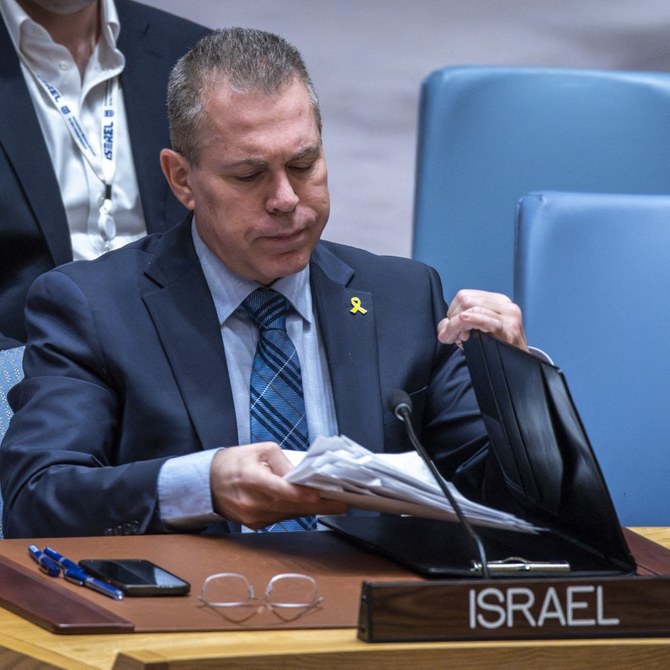Osma Al-Sharif
It is still difficult to say when and how the war on Gaza will end. Even as the UN Security Council passed a resolution on Monday calling, for the first time since the conflict began six months ago, for a lasting ceasefire, Israeli officials were quick to brush it off, insisting they will not stop until Hamas is defeated and the hostages are released.
The US representative to the UN, who abstained from the vote, stunned her council colleagues when she described the resolution as “nonbinding.” Meanwhile, negotiations for a temporary truce between Israel and Hamas remain bogged down as the humanitarian catastrophe in beleaguered Gaza breaks new records every day.
What is at stake today is not only the fate of 2.2 million Gazans, the prospect of a just and lasting settlement to the Palestine question, which is long overdue, and an end to Israeli exceptionalism, but the very future of a world order that is tilting and on the brink of collapse. The day after the war in Gaza ends will be the most challenging test for Israel, the Palestinians, the countries of the wider region, and the US. One thing is clear: The Middle East will not return to the way things were before Oct. 7. The same applies to the rest of the world, as countries grapple with the fallout from the war, the unfolding humanitarian crisis in Gaza, the ensuing political gridlocks, the veracity of the rule of law, the discredited international order, and ultimate accountability.
There will be a pressing need to examine the root causes of the conflict, draw adequate conclusions, and adjust course to contain blowbacks and prevent a recurrence. This will necessitate soul-searching and bold decisions, some of which will be hard and painful. For the Palestinians, the day after will require that two crucial challenges are addressed: ending the political rift that has weakened and splintered the Palestinian national movement, and reviving and reforming the Palestine Liberation Organization as the only legal body representing the will of the Palestinian people, under occupation and in the diaspora.
That reformed organization must encompass all factions and hold democratic and free elections to choose a leadership that can decide the future path to national liberation and self-determination, all while renewing its commitments to international law and UN resolutions. The new leadership will have to tackle some tough questions, including: the future of the Oslo Accords, which Israel has all but abandoned; the viability of the two-state solution; redefining the concept of Palestinian statehood; and holding Israel accountable as an occupying power for its war crimes in Gaza and the West Bank.
For Israel, there will be public demands to investigate the events of Oct. 7. But beyond that, pressure will mount to hold early elections. The choice of Israelis at the polls will determine the future of the “new Israel” that Prime Minister Benjamin Netanyahu has helped create over the past decade. The war on Gaza will represent a pyrrhic victory for Israel. It has never been so isolated, paranoid and demonized, eliciting feelings of a “Masada complex” and making it more dangerous to itself and others than ever before.
After inflicting such pain and horror on the Palestinians, Israel must also confront the ghost of its enduring curse: the occupation. At that decisive juncture, Israelis must decide what path to take: Either live in peace with the Palestinians, free of occupation and subjugation, or relive the recurring nightmares of bloodletting, abomination and eternal guilt.
Israel must also decide whether it will continue to be a fortress, just like Masada, that lives by the sword, only to perish by it. Or whether it will choose to become a normal state in the region.
The choices Israel makes will determine its fate and that of the region as a whole. Its allies in the West must help it make the right decisions. Netanyahu’s Israel is unhinged, locked in delusions of grandeur, and ultimately bent on self-destruction.
For the wider Middle East, the day after the war will require a comprehensive revision of the region’s collective security imperatives. There is a genuine sense of urgency about resolving the Palestine question. A new security paradigm is needed to ensure there is no repetition of the Gaza debacle. The fundamentals of a peaceful resolution and sustainable security for all must be redefined, and Israel will have to make a choice that it has evaded for decades: end the occupation and be accepted in the region.
Regional security means that the politics of war, as pursued by regional powers and their proxies, must end. That mantra must apply to the entire region: Libya, Sudan, Yemen, Syria, Lebanon and Iraq.
Failing states must be supported and revived. Nonstate actors must finally be incorporated into central states. A new approach to resolving conflicts must be discussed and considered through an association that aims to cushion the region against geopolitical upheavals and superpower polarization. These are tall orders but they are needed if the region is to break the cycle of violence that has squandered its wealth, weakened states, propped up nonstate actors, triggered civil and sectarian wars, and fueled famine and poverty.
Unless a bold initiative is proposed that delivers a clear perception of the region after the war in Gaza and beyond, the deep fissures that threaten its future will run even deeper.
For the US, a new and fresh perception is required that is distinct from the type of radical, partisan politics of the past few decades that have delivered a cynical, simplistic and insulting view of the region, its people and its culture.
The US must address the question of why it has become so hated and reviled by the overwhelming majority of the people in this region. At the heart of all of this is America’s controversial ties with Israel, which have stripped the US of any meaningful leverage during the war in Gaza and made it directly complicit in the genocide of the century.
Israel has become a liability for the US, not only in the region but around the world. That is something for the American people to address and examine. For the Middle East, and its population of more than 400 million people, the question is whether the US can forge a regional policy that is independent of the narrow interests of Israeli expansionists and delusional religious warmongers. Beyond all this lies the fate of the international world order, the rule of law, and the concept of justice and impartiality under the law.
Israel’s long-tolerated exceptionalism has ended and the world must inform authorities in the country of this new reality. They must be held accountable for their actions if the legitimacy of world institutions is to be upheld and respected. Israel cannot be the exception anymore.







